Purpose and Sustainability
Fujitsu Technology and Service Vision 2021
In the Fujitsu Technology and Service Vision 2021 edition, we introduce five important trends that will shape the new world after the inflection point. We also explain how our commitment to responsible business will help to build a more sustainable world. We share future scenarios in specific focus areas and outline how technology innovations are already making these future scenarios a reality.
Aside from the huge disruption caused by the pandemic, we also face many long-term societal challenges, from climate change to an ageing population. We explain how our purpose and commitment to responsible business will help to build a more sustainable world.

Purpose-driven society

Aside from the obvious disruption caused by the global pandemic, we face many long-term societal challenges, from climate change and industrial pollution through to aging populations, wellbeing and inequality. These are complex issues that cannot be solved by individual governments alone. How should business leaders face these challenges?
The mindset of business leaders around the world is changing rapidly. According to Fujitsu’s global survey in 2020, 92% believe that providing value to society is important for the mid-to-long-term sustainability of their business. It’s clearly becoming essential to align business goals with societal goals. The United Nations Sustainable Development Goals (SDGs), set out in 2015, provide shared goals for a better world. We need coordinated, collaborative strategies to achieve these goals by 2030.
Here we introduce Fujitsu’s purpose, steps on the transformational journey toward a regenerative society, and our commitment to responsible business, including our contribution to SDGs and a decarbonized world.
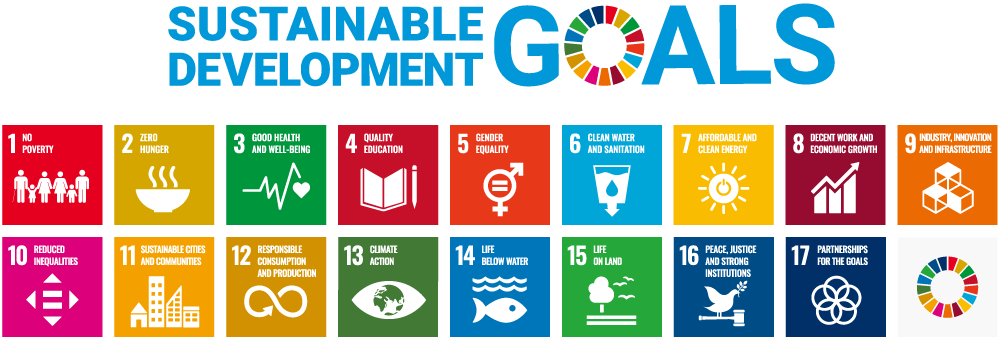
Our purpose
To make the world more sustainable by building trust in society through innovation.

The world has become more interconnected with ever-increasing complexity, facing many difficult challenges. Technology has a great power to solve them. As a global company with a long history of delivering technology-based value to customers, it is our responsibility to contribute proactively to the transformation of society.
Fujitsu announced our purpose in 2020. We will focus all our resources on making the world more sustainable by building trust in society through innovation.
But how can we empathize people’s challenges, and collaborate and act with agility to create solutions that make a positive impact to the environment and society? This requires each one of us to deeply think about our purpose and internalize it as our own individual agenda.
To help our people to embrace our purpose, we have started a program called Purpose Carving. This helps individuals to carve out their own purpose, helping them think about how this intersects with Fujitsu’s overall purpose. Starting with the Fujitsu management team, we are rolling this program out to our people around the world.
Toward 2030
In order to build a sustainable society where no one is left behind, we need to connect people, communities, organizations, things and data, to deliver value that’s focused around people and to generate innovation that solves societal challenges.
In accordance with our purpose, we’re committed to delivering trust in society through innovation. We believe the following three elements are crucial for enabling such innovation. Firstly, a human centric approach that improves people’s wellbeing and respects their individual needs and dignities. Secondly, predictive and preventive methods to strengthen resilience against ever-growing uncertainty. Thirdly, connected services that can solve increasingly complex societal issues. We need to combine all three of these elements.
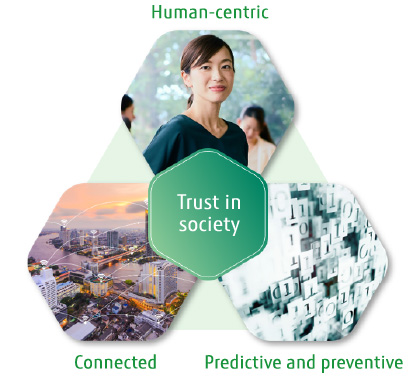
Human-centric
Provide personalized services that help people to maximize their potential without leaving anyone behind.
Connected
Create a trusted digital society where people can enjoy secure, connected lives, co-creating innovative services by connecting data and knowledge.
Predictive and preventive
Build a digital society where people can live prosperous and healthy lives through predictive and preventive methods. Use real-time data to develop the most effective measures.
Steps on the digital journey
In order to transform into a more trusted society, we need a step-by-step approach that strengthens resilience, delivers greater value to society and co-creates new value through ecosystems.
In order to solve complex social challenges, it’s essential to adopt an ecosystem model, in which many organizations share their knowledge and skills.
This is the roadmap to creating a more trusted business and society. If an organization fails to maintain the trust of their stakeholders, they will not be sustainable.
1 Strengthening resilience
Strengthen resilience through digitalization.
2 Becoming more relevant
Transform existing business to deliver greater value to society.
3 Evolving into an ecosystem business model
Develop an ecosystem business model that co-creates social value.
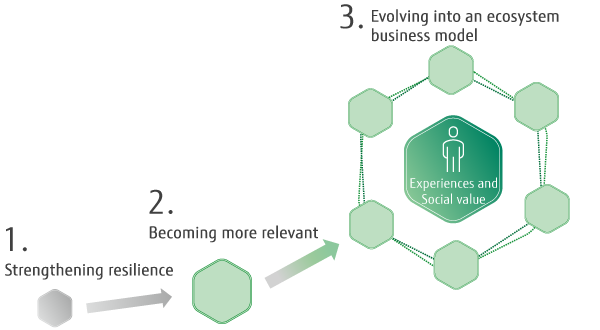
Regenerative society and connected ecosystems
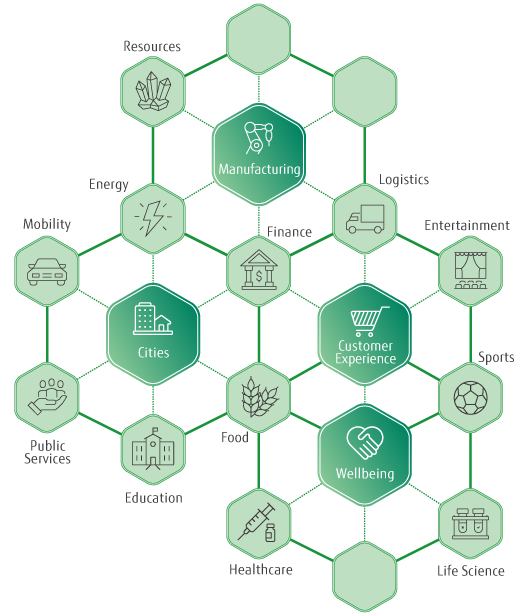
As we move into the human era, traditional vertical industry structures are collapsing, replaced by new ecosystems capable of providing the value people need.
Connecting data from end to end is key to the success of these new ecosystems. This will enable transformation from a mass production and mass consumption economy to a circular economy, with the potential to address the environmental and social issues created by economic growth.
Until now, we’ve used financial value as a common global performance indicator. Our economy and society are deeply rooted in the flows of financial value. We now need to think about shifting to a more purpose-driven society, where non-financial, intangible value, as well as financial value, flows throughout society. Such non-financial value must correspond to common goals of society and has to be validated in a trusted way. For example, the amount of CO2 emitted, and renewable energy used, by each organization in the entire global value chain needs to be evaluated as intangible value.
Fujitsu enables new ecosystem business models by connecting various services with trusted data and turning this data into value.
Responsible business
As environmental and social challenges such as climate change, pandemics and growing inequality become more pressing, management must take all stakeholders into consideration. In order to fulfil our responsibility as a global company, Fujitsu sets out our key sustainability management agenda as Global Responsible Business (GRB). For each of the seven key agenda items, including human rights, diversity and inclusion, wellbeing, the environment, compliance, supply chain, health and safety, and communities, we have created clear visions, including annual KPIs for 2022.
We are confident that these activities will generate greater trust from customers and communities, as well as even stronger engagement with employees. To evaluate the success of these measures, we set non-financial indicators, including employee engagement, customer Net Promoter Score and DX indicators, in addition to traditional financial indicators like revenues and profits. In this way, we aim to achieve sustainable growth with well-balanced financial and non-financial performance targets.
Global Responsible Business
Give consideration to human dignity and conduct human-centric value creation in corporate activities; respect diversity and foster a corporate culture in which everyone can contribute while remaining true to themselves.
Create an environment where all employees can work with vitality and provide employees with opportunities to realize self growth and to take maximum advantage of their talents.
Help address environ-mental issues by implementing climate change countermeasures that contribute to the achievement of the Paris Agreement’s 1.5°C target by providing innovative solutions.
Ensure that employees of all organizations are rigorously informed about the Fujitsu Way Code of Conduct; cultivate awareness of higher levels of corporate ethics, including societal norms; and act with sincerity.
Realize procurement in the Group’s supply chains that is highly diversified and which takes responsibility for human rights, the environment, and health and safety.
Give first priority to ensuring safety as well as sound physical and mental health and provide safe, healthy workplace environments that reflect the circumstances in respective countries and regions.
Conduct activities with a heightened sense of empathy for societal issues and create favorable socioeconomic impacts; and connect created impacts to even greater value.
Contribution to the SDGs

To realize responsible business, we understand the importance of creating the correct mindset with our employees, including raising their awareness of global challenges. In 2020, Fujitsu rolled out a new SDG Community called Kizuna. This is now being extended across multiple regions including Japan. This is a platform for employees to voluntarily select one of the SDGs and allocate a portion of their time to collaborating and sharing relevant ideas and information with their colleagues. Here are some examples of activities already underway.
We work with a Children’s Welfare Home in Xi’an, with support and donations, including books, clothing, and toys.
We work with HelpAge India towards protecting the rights of India's elderly and providing relief to them to enable them to live better and healthier lives.
We provide on-line learning tools to help our employees’ children understand the importance of being responsible, caring citizens, covering topics such as human rights, the environment and mindfulness.
Our education collaboration with The Makabata Foundation and SOS Children's Village has helped provide valuable life lessons ranging from IT skills through to Japanese culture.
We partnered with Voces Vitales in Costa Rica to deliver a year-long mentoring program, focusing on gender equality in the workplace.
We have built a long-term relationship with the PIN Academy, delivering workshops and upskilling young people with neurodiverse conditions.
Our employees have held virtual cultural celebrations for employees and their families, helping all employees explore and celebrate different cultures.
We provided vital supplies of food and cleaning equipment for animal shelters. As a result, we were proud to receive the Best Social Project award from Kazan City Council.
Our approach to environmental issues
The world is moving toward decarbonization. Climate change is widely recognized as a critical problem that threatens human existence. More than 120 countries, including Japan, and the European Union, have already declared that they will reduce net CO2 emissions to zero by 2050.
As a global technology company, Fujitsu is proactively contributing to a decarbonized society. We’re working to achieve zero CO2 emissions from our own operations, to help our customers and society decarbonize and to mitigate the damage caused by climate change.
In 2017, Fujitsu announced that we will reduce our CO2 emissions to zero by 2050. We are currently working to accelerate this initiative. We’ve set out nine targets from the perspectives of climate change, resource recycling and co-existence with nature. Furthermore, we raised the target for reducing the total volume of greenhouse gas emissions at our business sites in 2030 from 33% to 71.4% of that in 2013. Our new target was certified as ‘1.5˚C level’ of SBT*2 , updated from ‘well below 2˚C’, which we acquired in 2017.
*2 Science Based Targets: A global initiative for setting corporate GHG reduction targets based on scientific evidence.
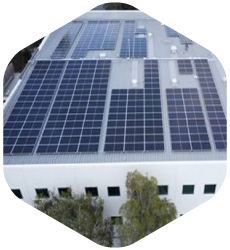

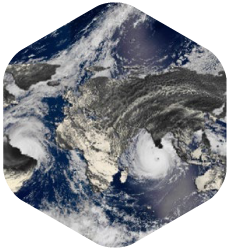
Working for a decarbonized society
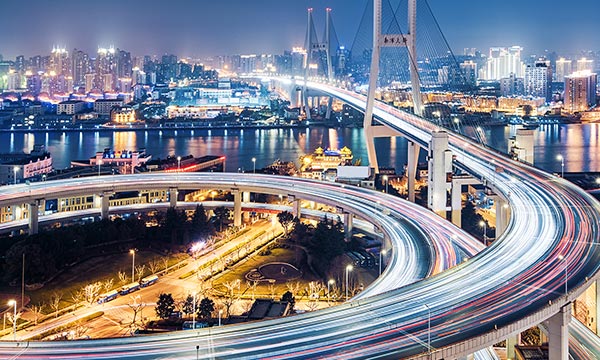
We’re already implementing various activities towards achieving a decarbonized society. In February 2021, Fujitsu announced that 100% of the electricity required to operate Fujitsu’s cloud service FJcloud in Japan will be renewable by FY2022. Customers using Fujitsu FJcloud will be able to achieve zero CO2 emissions for their related operations, helping them to achieve their decarbonization goals. In addition, we’re working with customers in various industries to reduce CO2 emissions by optimizing production and distribution and by promoting the wider use of renewable energy.
In addition, Fujitsu is working on transforming logistics that will lead to reduction of CO2 emissions. For example, we’re collaborating with Toyota Systems using Fujitsu’s quantum computing technology, Digital Annealer, and real data in North America to transform the efficiency of large-scale logistics. Digital Annealer solved the problem of searching more than 3 million routes to procure parts from hundreds of suppliers, distribute through several transit warehouses, and deliver them to dozens of plants. It helped to optimize the number of trucks, total mileage and sorting work. By carrying out a large number of optimization calculations in a very short time, we were able to identify new effective logistics routes, improving loading efficiency and reducing the number of trucks and total travel distance. We are confident that this technology will contribute to the reduction of CO2 emissions in logistics operations.
We will also use digital technologies and data to strengthen resilience to natural disasters caused by climate change, helping create a society where everyone can live with peace of mind.
Other articles of Fujitsu Technology and Service Vision 2021
- Purpose-driven society
- Our purpose
- Toward 2030
- Steps on the digital journey
- Regenerative society and connected ecosystems
- Responsible business
- Contribution to the SDGs
- Our approach to environmental issues
- Working for a decarbonized society







